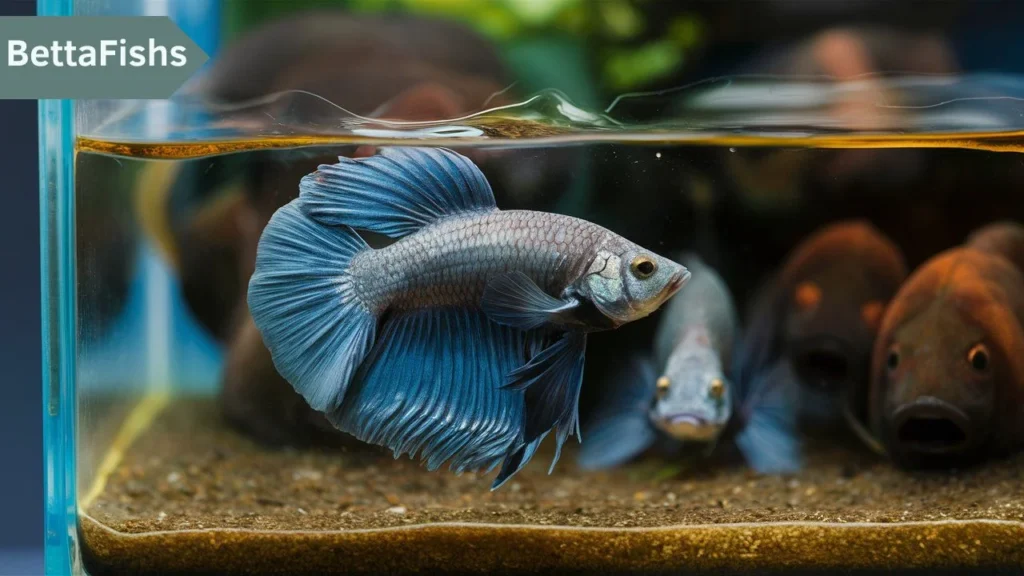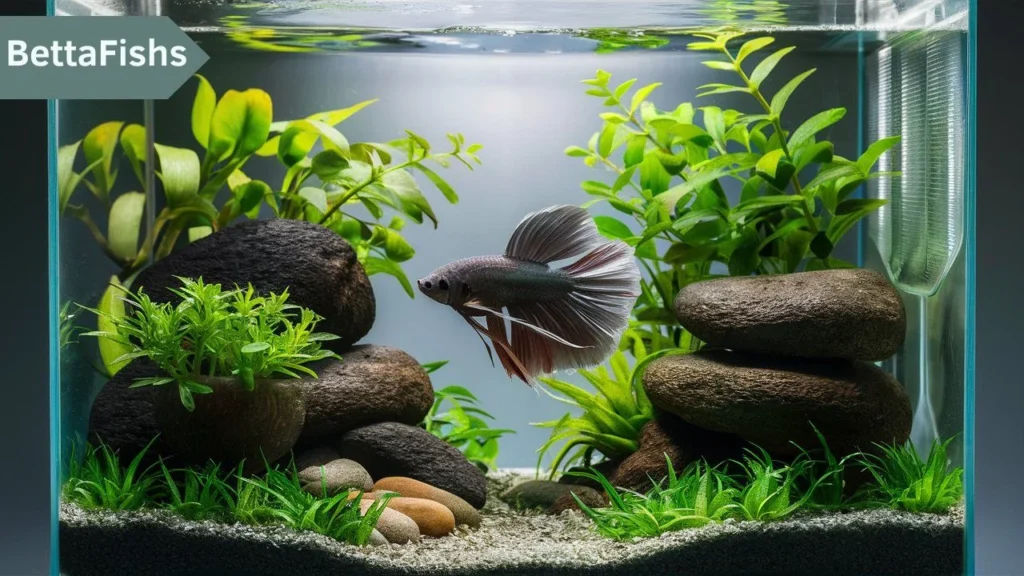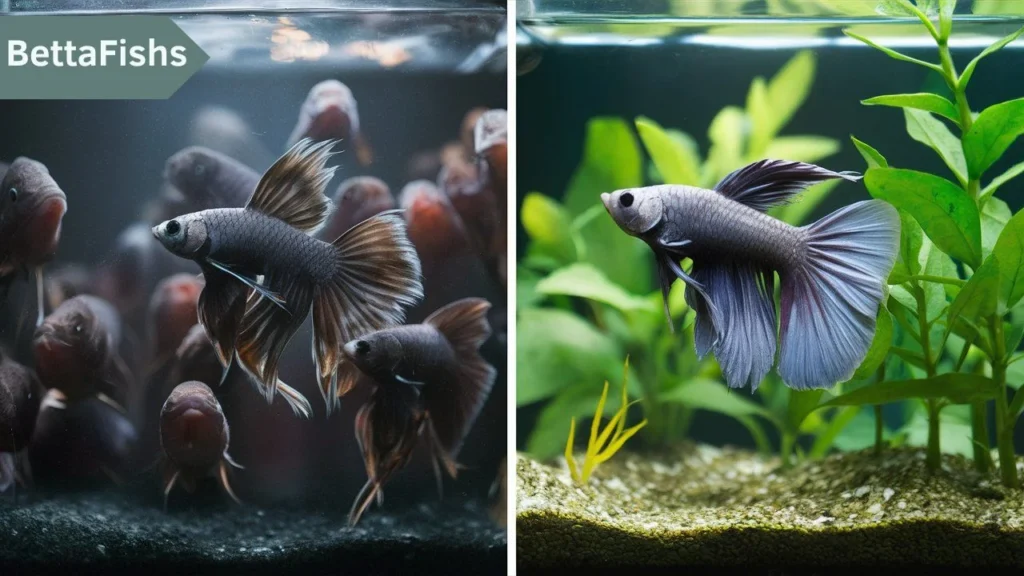What Are Betta Fish?
Siamese fighting fish, or betta fish, are brightly colored freshwater fish that are indigenous to Southeast Asia. Known for their striking fins and aggressive nature, Betta fish are a favorite among aquarium enthusiasts. These fish are a popular choice for both novice and seasoned aquarists because of their relative ease of care.
Why Betta Fish Are Popular Pets
The allure of Betta fish lies in their vivid colors and unique personalities. They are low-maintenance compared to other fish species, which contributes to their popularity. However, their aggressive tendencies mean that they require special care to ensure they remain healthy and stress-free.
Causes of Stress in Betta Fish
Environmental Stressors
Poor Water Quality
Water quality is a crucial factor in maintaining a healthy environment for Betta fish. Poor water conditions, such as high levels of ammonia, nitrites, or nitrates, can lead to stress. Regular water changes and monitoring are essential to keep these levels in check and prevent stress-related illnesses.
Inappropriate Tank Size
Betta fish are often kept in small bowls or tanks, which can lead to stress due to lack of space. A minimum of a 5-gallon tank is recommended to give them enough room to swim and explore. A cramped environment can cause stress and lead to various health issues.
Temperature Fluctuations
Betta fish are tropical creatures that thrive in water temperatures between 76°F and 82°F (24°C to 28°C). Sudden changes in temperature can be a significant stressor. It’s essential to use a reliable heater and thermometer to maintain a stable temperature in the tank.

Social Stressors
Aggression from Tank Mates
Male betta fish in particular are noted for being fiercely territorial. Introducing them to a tank with other aggressive fish or placing two male Bettas together can lead to fights, resulting in stress and injury. It’s best to house Betta fish alone or with compatible species.
Overcrowding in the Tank
Overcrowding can also lead to stress in Betta fish. A tank with too many fish can cause competition for food, hiding spots, and territory. This competition can stress Betta fish and weaken their immune systems, making them more susceptible to diseases.
Other Common Stressors
Lack of Hiding Spots
Betta fish need hiding spots to feel secure. A tank without plants, caves, or decorations can make them feel exposed and stressed. Providing ample hiding spots helps them feel safe and reduces stress.
Improper Diet
An unbalanced diet can also stress Betta fish. Feeding them the wrong type or amount of food can lead to malnutrition, which can weaken their immune system and cause stress. It’s crucial to provide a varied diet that includes high-quality Betta pellets, live or frozen foods, and occasional treats.
Recognizing Stress Symptoms in Betta Fish
Physical Symptoms
Clamped Fins
One of the most common signs of stress in Betta fish is clamped fins, where the fins are held close to the body instead of fanning out. This can indicate discomfort or illness and should be addressed immediately.
Loss of Color
Betta fish are known for their vibrant colors, but stress can cause them to lose their brightness. A dull or pale appearance can be a sign of stress, particularly if it occurs suddenly.
Labored Breathing
If you notice your Betta fish gasping for air at the surface or breathing heavily, it could be a sign of stress due to poor water quality or illness. This symptom requires prompt attention to identify and resolve the underlying cause.

Behavioral Symptoms
Lethargy
A stressed Betta fish may become lethargic, spending most of its time resting at the bottom of the tank or hiding. This is often a sign that something is wrong in the tank environment or that the fish is unwell.
Loss of Appetite
Stress can cause a Betta fish to lose its appetite, leading to weight loss and malnutrition. If your Betta fish is not eating, it’s essential to check for other signs of stress or illness.
Excessive Hiding
While Betta fish need hiding spots, excessive hiding can be a sign of stress. If your Betta is constantly hiding and not exploring its environment, it may be feeling insecure or threatened.
Preventing Stress in Betta Fish
Proper Tank Setup
Choosing the Right Tank Size
A spacious tank is crucial for preventing stress in Betta fish. A minimum of 5 gallons is recommended, but larger tanks are even better. A bigger tank allows for more stable water conditions and gives your Betta plenty of space to swim.
Maintaining Optimal Water Quality
Regular water changes and filtration are key to maintaining a healthy environment for your Betta fish. Testing the water for ammonia, nitrites, and nitrates, and ensuring the pH is between 6.5 and 7.5 will help keep your Betta stress-free.
Ensuring a Balanced Diet
Feeding your Betta fish a varied and balanced diet is essential for its overall health. High-quality Betta pellets should be the staple, supplemented with live or frozen foods like brine shrimp or bloodworms. Avoid overfeeding, as this can lead to obesity and stress.
Creating a Peaceful Environment
Ensure that your Betta’s tank is in a quiet location, away from loud noises and constant movement. Providing a peaceful environment helps reduce stress and allows your Betta fish to thrive.
How to Treat a Stressed Betta Fish
Immediate Steps to Take
Quarantine the Fish
If you notice signs of stress, it may be necessary to quarantine your Betta in a separate tank. This allows you to monitor its behavior closely and make any necessary adjustments to the water conditions or environment without stressing other fish.
Improve Water Conditions
Check the water quality immediately if your Betta shows signs of stress. Perform a partial water change, clean the tank, and ensure the water temperature is within the optimal range. Sometimes, improving water conditions can quickly alleviate stress symptoms.
Long-Term Care Strategies
Regular Monitoring of Behavior
Regularly observe your Betta’s behavior for any changes. Early detection of stress symptoms allows for timely intervention, which can prevent more serious health issues from developing.
Stress-Relief Products
There are various stress-relief products available, such as water conditioners with calming properties or stress coats that help protect your Betta’s skin. These can be used to reduce stress, particularly after a water change or when introducing a new Betta to the tank.

Conclusion
The causes and symptoms of stress in Betta fish are crucial for any Betta owner. By recognizing the signs early and taking proactive steps to create a suitable environment, you can ensure your Betta fish remains healthy and happy. Regular monitoring and proper care are key to preventing and managing stress in these beautiful and unique pets.
FAQs
How can I tell if my Betta fish is stressed?
Look for signs such as clamped fins, loss of color, labored breathing, lethargy, loss of appetite, and excessive hiding. These symptoms can indicate that your Betta is stressed and needs attention.
Can stress in Betta fish lead to death?
Yes, prolonged stress can weaken a Betta fish’s immune system, making it more susceptible to diseases that can be fatal. It’s important to address stress promptly to prevent serious health issues.
How often should I check the water quality in my Betta’s tank?
It’s recommended to check the water quality at least once a week. Regular monitoring helps maintain a healthy environment and prevents stress caused by poor water conditions.
Is it okay to keep Betta fish with other fish?
Betta fish can coexist with other peaceful species, but care should be taken to choose compatible tank mates. Avoid aggressive or fin-nipping species, and ensure the tank is not overcrowded.
What are some natural ways to reduce stress in Betta fish?
Providing a well-planted tank with plenty of hiding spots, maintaining optimal water conditions, and ensuring a quiet environment are natural ways to reduce stress in Betta fish.





One Comment
Leave a ReplyOne Ping
Pingback:Betta fish diseases and treatments